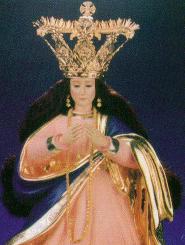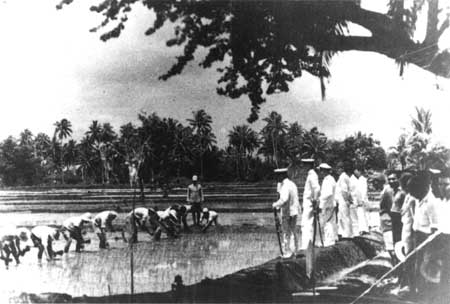On July 21st Guam celebrates its 64th Liberation Day commemoration marking the day the United States retook the island from Japan after over two years of occupation in World War II. My father and my mother along with their families were there during that horrific occupation time period. It is now etched in our family psyche and legacy.
Japan invaded Guam on December 8, 1941. It was exactly about the same time period as Pearl Harbor but Guam was a day ahead in the International Dateline. For my family and the rest of Guam, the attack was especially poignant since it came on the biggest local religious holiday (next to Christmas and Easter), the Feast of Our Lady of Camarin. With the island being almost 100% Roman Catholic, most islanders were at mass. The largest mass was in the present day Basilica in the capital city of Hatgatna. It is of special note that the faith of the local Chamorros (the natives of Guam) will play a large role in unifying them and assisting them in coping with the hardships of being held hostage in their own island.
When I think of Liberation Day, I think of my late grandfather John Blas Leddy. He was the eldest son of Henry Vincent Leddy and Maria Santos Blas. Henry was an Irish American from New Jersey who was assigned to the Marine Garrison on Guam shortly after the island was ceded to the United States from Spain. Henry married Maria and lived on Guam until shortly after her death.
Little is really known on why Henry left my grandfather and his siblings on the island with his deceased wife’s mother. However, my grandfather did tell me that his father did not get along with his mother’s relatives. He also said that that they had kept letters from his dad away from him when he wrote from the states. There seems to be some credence to his story because from genealogy research, I found out from veteran medical records show that Henry passed away due to symptoms from consumption. In those records, he always listed the names of his wife, Maria and his children. He was always referencing them. For a white man who had children in some far flung island, he did not keep them hidden. It revealed a lot about how he felt about them in his heart.
Being orphaned, caused my grandfather to grow up fast and very independent. He was self sufficient and he was a proud man.
That is why when the Japanese overtook Guam it was especially difficult for him. I would join my siblings and cousins at my grandfather’s house and listen at his feet when he talked about the war. He talked about how the Japanese would come into his home and take away all the food from the house to feed the soldiers. He had 8 children.
He, like many fathers on the island, would go deep into the jungles, and clear some land to grow some vegetable gardens. These plots of land are know as “ranches” on Guam. He and his sons would tend to them in secret. He would find ways to hid food sources from the Japanese. It was a true game of survival.
My grandfather was trying to keep his family from starving or from dying from disease. The alternative was unthinkable.
Another thing that my grandfather had to deal with was being mistaken for an American soldier. He had a very light complexion and blue-gray eyes. He was brought in for questioning. It took some time before he convinced them he was a local.
During the first part of the occupation, the government was run by the Japanese Navy. The treatment of the natives was “better” (for lack of a more appropriate term) than what was going to happen later.
However, the tide turned when the Japanese Army took over. Faced with the losing battle against the Americans in the Pacific, pressure mounted on strengthening the defenses on Guam. Able bodied Chamorro men and boys were drafted to work long hours building airstrips and roads. It was backbreaking forced labor under pointed gun.
The entire population of Guam was marched into a few concentration camps. During these marches, some of the elderly who fainted in the hot, humid tropical sun were beaten and left to die. Anyone who tried to help them were beaten also.
The camps were filthy, disease ridden and food was scarce. People died of starvation. Many suffered from even more malnutrition. My mom’s sister died in one of these camps.
There have been some reports that have alluded that the Japanese had planned to completely eliminate the entire island population if it looked like the Americans were going to succeed in their recapture of the island.
My grandfather remembers machine guns set up around the parameters of the camp pointing inward into the prisoners. There was one group that was killed in a cave in southern Guam.
Ironically, these camps turned out to be a blessing in disguise because when the battle for the liberation of Guam occurred, the concentrations of the island population in these camps lessen the number of local casualties.
My grandfather remembered that when the Americans entered the camps and freed them, the Chamorros were so happy that “Uncle Sam” finally came home. Some of the people had hidden the American flags. Some were worn and torn but they took them out and waved them. Guam was liberated.
My grandfather was tapped by the United States military to be a lead scout to assist them in ferreting out remaining Japanese soldiers hidden in the jungles once the U.S. regained control of Guam. Grandpa used to regale us with stories that were as exciting as a Rambo movie.
His service was honored with medals and recognition. His relentlessness in capturing the enemy earned him the nickname, “The Fighting Bull.”
I knew my grandfather many years after the war when age and wisdom softened his heart and when forgiveness towards the Japanese already filled his soul. However, he told me that at the time he was a husband and a father. Someone (the Japanese) had forcibly come into his house and taken his food and his land.
They hurt his children and his friends, and in some instances caused their deaths. He had to defend what was rightfully his and remove them out of his island. He pursued that goal with zest. He told me that he could smell them. They were not invited to his home and they had to go.
If anyone knows how important land and family are to a Chamorro, then one can understand the passion driving my grandfather.
Liberation Day is here. I think of Grandpa Leddy. He was not a perfect man but despite his flaws, he was able to show me how live with courage and conviction. He was actually made a Grand Marshall of one of the Liberation Day Parades.
When I think of Liberation Day, I think of democracy. I think of how he and my ancestors have earned it. I think of the hundreds of men who gave their lives on the beaches and jungles of Guam so that freedom rings every morning there. I honor them today.
There are several memorials on Guam to brave men and women of the armed services who sacrificed their lives on Guam during WWII. There is also a very special memorial to the islanders who were there during the occupation called the Guam Memorial Wall. My grandfather is listed there. My father and mother and other relatives are also listed there. It is appropriate and extremely touching. Most books about Guam do not address the experience of the islanders during the war. In fact, I remember reading one reference after spending chapters on the military campaign on Guam, one sentence followed: “The people of Guam suffered greatly.”
Some other reflections by other people…
http://www.guampdn.com/guampublishing/special-sections/LIBERATION2008/
http://www.guampdn.com/guampublishing/pacificedge/data/EkEyFyluEyRhqTRtZD.htm






I am amazed at the things I am still learning about you JP, what a story!!!
Your information cut to my soul. My father was sent us to Guam in 1950 and Maria Conception helped raise me. I have only learned these stories as I get older and thanks to the internet. I lived on the Naval base in Agana. Please keep up your writing so all can learn.
Peggy
Hey I was looking into my family history. My grandma was Elsie, Henry and Maria’s daughter, she died when I was 11 and I’m just learning about my family history, and you have been my only source of info pre-Elsie! So thanks, and if u contact me that would be badass I am trying to learn more about my family, and apparently we are distantly related